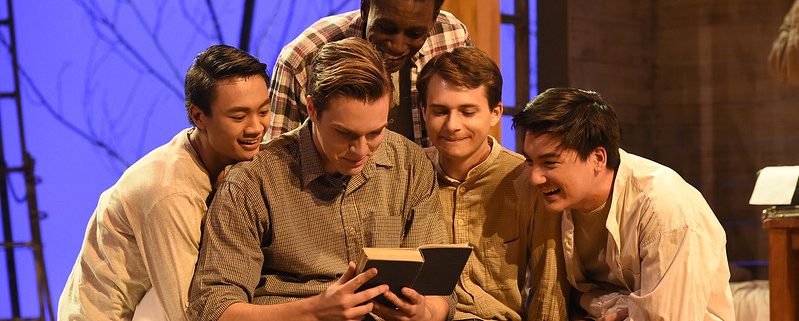REVIEW: Student performers triumph in new SDA play

The School of Dramatic Arts finished its run of its most recent production “The Cider House Rules Part One: Here in St. Cloud’s” and “The Cider House Rules Part 2: In Other Parts of the World” Sunday.
The story, which spans from the 1880s to the 1950s, details the life of the orphan Homer Wells (played by Tim Frangos, a junior double majoring in theatre and law, history and culture), who spends the majority of his childhood and early adolescence at an orphanage in St. Clouds, Maine.
The first part of the play follows Wells’ relationship with Dr. Wilbur Larch, the orphanage’s director and physician, who is played by Shrey Bhargava, a senior majoring in theatre and cinema and media studies. While shadowing Dr. Larch, Wells discovers his talents and abilities in the medical field. Dr. Larch, who performs secret abortions, encourages Homer to pursue a medical career, but Homer is preoccupied with searching for a home of his own outside the orphanage.
Ultimately, Homer is adopted by Candy (Alexandra Punch, a sophomore majoring in theatre) and her boyfriend Wally (Nicholas Petroccione, a senior majoring in theatre) after they come in seeking an abortion. Homer is faced with the difficult choice between leaving behind the people who have become his family during his adolescence and pursuing a new life full of hope and promise.
The second half picks up immediately where the first leaves off, following Wells and the rest of the cast throughout the next 15 years of their lives. Homer and Candy fall in love and — after believing Wally was shot down piloting in a plane in Burma — conceive a child together. When they learn Wally has been found alive, they choose to raise the baby separately and claim their son was adopted. By the end of the play, after Dr. Larch has died, Homer ultimately decides that it is his duty to carry out his practice of abortions, giving patients the freedom to choose the destiny of their own lives.
The actors’ performances were captivating and cathartic. Most students portrayed characters much older than themselves and, because the story spanned several decades, were tasked with the challenge of maturing right in front of the audience’s eyes. Dr. Larch begins as a young man (presumably in his late 30s to early 40s) and by the shows’ end is somewhere in his 90s.
Bhargava is not only able to portray this emotionally by letting the audience in on the hardships that have weighed down his character over time, he is also able to mimic the aging process in his physicality. With his movement slowed and posture dropped over time, the audience can forget that this is a young man portraying an older one. This production was given the same rehearsal time as any other SDA show, yet was tasked with putting on two productions — and the result being a testament to the hard work and determination of the students.
The play’s heavy themes and topics only further add to the depth and vulnerability the actors displayed. Abortion, rape, abuse, love and loss permeate the work. In one instance, the character Rose Rose (played by Winona Weber, a sophomore majoring in acting), a 14-year-old girl who is abused and raped by her father, is learning to ride a bike, falls off and injures herself. Though she hurts herself, she admits it was not enough and that she was trying to hurt the baby she was carrying. Weber’s performance matched innocence with wisdom and maturity — we see a young girl who is faced with the problems of adult life all too soon.
Rose Rose falls for Angel Wells, Homer and Candy’s son, in the second part, but knows that her father will continue to abuse her if she stays in town. And although staying with Angel may be the optimal choice, and it may be what the heart desires, she knows that it is ultimately better to run away and save herself from her father’s manipulation.
Through all the wonderful work of the cast and crew, the play leaves the audience asking themselves whether it’s better to be right or to be good. Do we follow the rules that have been set for us by both ourselves and others because we think it is a good thing to do? Or do we break those rules and follow our guts, doing what we believe is right for our own well-being?
Overall, the production brought aspects of humor and poignancy to the USC stage and allowed for the students to creatively explore a rich and invigorating text.


